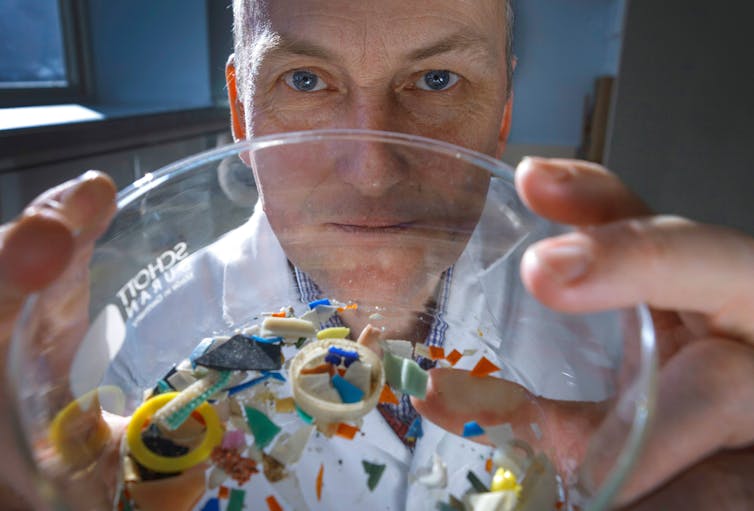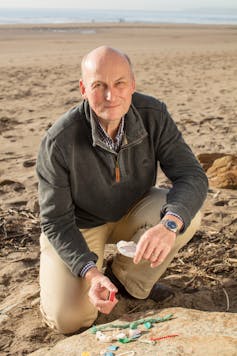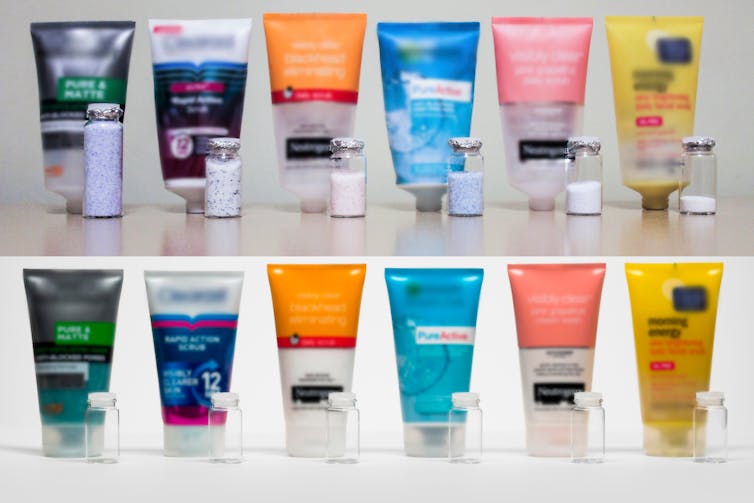‘Everywhere we looked we found evidence’: the godfather of microplastics on 20 years of pollution research and the fight for global action
Since coining the term microplastics 20 years ago on May 7 2004, Richard Thompson reflects on the progress being made to halt plastic pollution.

Thirty years ago, while counting barnacles, limpets and seaweeds along rocky shores, I started noticing a daily tide of litter, mostly plastic. As a marine biology PhD student at Liverpool University, I kept removing it, but the next day, there’d be more.
I’m now a leading international expert on microplastics, a term I coined on May 7 2004 to describe fragments of plastic measuring as small as a millionth of a metre. As I work to help reduce the grip of plastic pollution on our planet, the solutions are clear to me.
Regulators, governments and citizens all urgently need to turn off the tide of plastic pollution at its source by reducing the production of plastics. But having just returned from the UN global plastics treaty negotiations in Ottawa, Canada, it’s frustrating to see the lack of consensus among nations about how to address this global problem.
Disturbed by the scale of the plastic contamination I first noticed on that beach in 1993, I felt compelled to act. I recruited students and the local community to help with the annual Marine Conservation Society’s beach clean. We recorded what we found on printed templates.
Back then, a new tool was just becoming available for data compilation: the Excel spreadsheet. The budding scientist within drove me to tabulate what we removed, based on the categories on the printed templates that included bottles, bags, rope and netting. Suddenly, it struck me that the most numerous items had no category. Fragments of larger plastic items, which appeared by far the most numerous were not being recorded. I got curious and wondered what the smallest plastic pieces on the shore were.

When I began teaching a few years later, I challenged my students to find the smallest pieces of plastic on the beach. Looking amongst the sand grains, there they were – tiny blue and red fibres and fragments.
An almost forensic journey ensued to confirm their identity. In collaboration with a polymer chemist, we confirmed the tiny fragments were common plastic polymers – polyethylene, polypropylene, polyvinyl chloride (PVC) – that presumably formed via mechanical degradation and were accumulating as fragments smaller than the grains of sand themselves.
I was hooked on discovering more about this new form of contamination. Working initially with postgraduate students at the University of Plymouth where I was lecturing, we found that these pieces were common on the shore and in seabed mud and we showed they were eaten by marine life. Most alarmingly, we used archived samples of plankton that had been collected decades previously to demonstrate that the abundance of microplastics had increased significantly since the 1960s and 1970s.
I pulled together nearly a decade of this research into a one-page summary entitled “Lost at sea: where is all the plastic?” That paper, published in the journal Science 20 years ago, was the first to use the term microplastics in this context. Within a couple of weeks, this became a worldwide news story.
Everyone wanted to know whether microplastics were harmful. I set out to establish the wider distribution and determine whether they might be harmful to humans and wildlife.
Despite huge media and policy interest, funding was a challenge. One anonymous reviewer commented that there will never be enough plastic in the oceans to cause the sort of harm Thompson wants to investigate.
Over the years that followed, my team and I showed that microplastics were common on shorelines worldwide, they were abundant in the deep sea, in Arctic sea ice and in multiple species of fish. They weren’t just polluting marine environments. They were present in rivers and snow from near the summit of Mount Everest. Everywhere we looked, we found evidence of microplastics.

By 2008, the term microplastic was highlighted by the EU’s flagship marine strategy framework directive, a policy introduced to maintain clean, healthy, productive and resilient marine ecosystems. It stipulated that “the quantities of plastic and microplastic should not cause harm in the marine environment”.
We demonstrated that, if ingested, microplastics could transfer from the gut to the circulatory system of mussels and that nanoparticles could pass through the bodies of scallops within a matter of hours. We demonstrated the potential for chemical transfer to wildlife and confirmed that the presence of microplastics could have negative consequences, reducing the ability of organisms to put on weight.
A UK parliamentary environmental audit committee requested a special report on microplastics in 2016. I was called to give evidence, and perhaps prompted by comments from my colleagues, MP Mary Creagh referred to me as the “godfather of microplastics” and so it entered the public record.
There are now thousands of studies on microplastics published by researchers worldwide. Policy interventions resulting from this work include the UK ban on plastic microbeads in rinse-off cosmetics, and EU legislation to prohibit intentional addition of microplastics to products which could prevent hundreds of thousands of tonnes of microplastics entering the environment.

However, the largest source of microplastics is the fragmentation of larger items in the environment. So ultimately, we need to take action to reduce the production of a wider range of plastic products than just those containing microplastics.
Without action, plastic production could triple by 2060. Yet, some nations seem set on a path to increase production rather than reduce it.
Treaty negotiations
Last week, I was in Ottawa where 180 nations debated the content of the global plastic pollution treaty, a text that contains more than 60 references to microplastics.
What can be done to halt this accumulation? Microplastics are almost impossible to remove. Even for larger items, clean up won’t solve the problem. Novel materials such as biodegradable plastics may offer benefits in specific circumstances but won’t solve plastic pollution.
Read more: A global plastic treaty will only work if it caps production, modelling shows
I left the negotiations with mixed emotions. Pleased that the scientific community had delivered sufficient hard evidence – including some of my own research – on plastic pollution to initiate the need for this global treaty. Saddened that 180 nations found it so hard to reach a consensus on the way forward. Negotiations failed to stipulate that independent scientists should even be included in formal expert working groups.
Like many scientists who helped deliver the evidence of harm, it’s immensely frustrating to potentially be sidelined from an international process that hopes to deliver solutions. It may be hard for some to swallow – I saw one delegate holding a single-use plastic water bottle behind his back during negotiations. Contrary to the outcome of those midnight discussions in Ottawa, the focus must be on prevention by reducing global production of plastic polymers and ensuring any plastic items we do produce are essential, safe and sustainable.
Richard Thompson has received funding from the Leverhulme Trust, NERC, ESRC, Defra, EU and National Highways. He is the co-coordinator for The Scientists' Coalition for an Effective Plastics Treaty which is hosted by the International Knowledge Hub Against Plastic Pollution.
